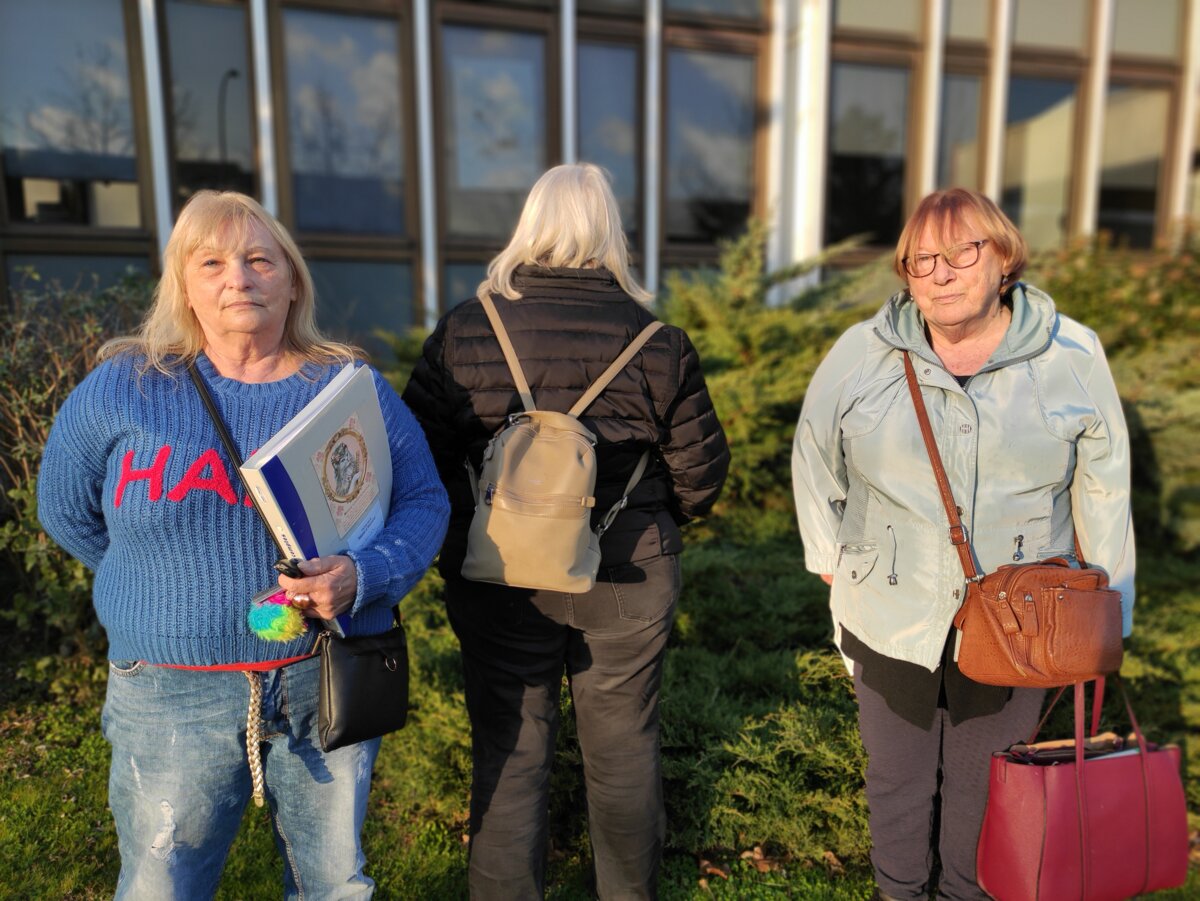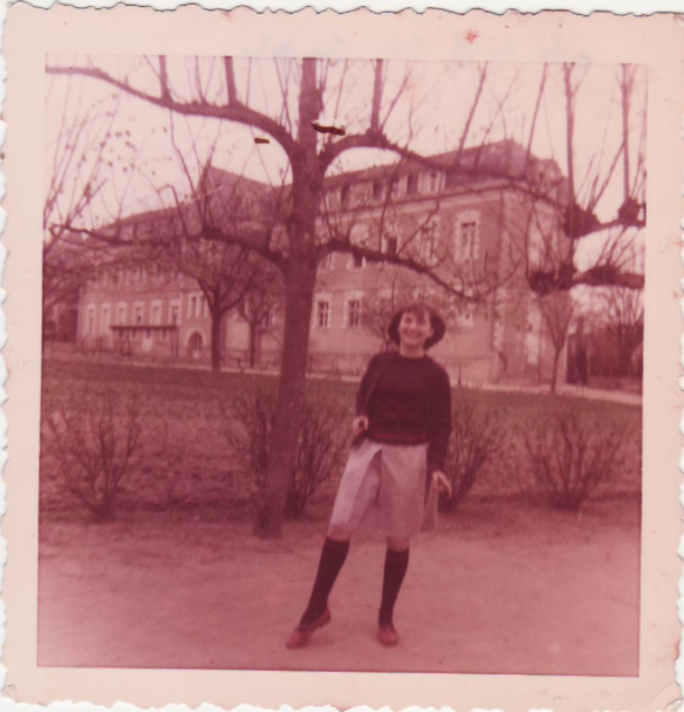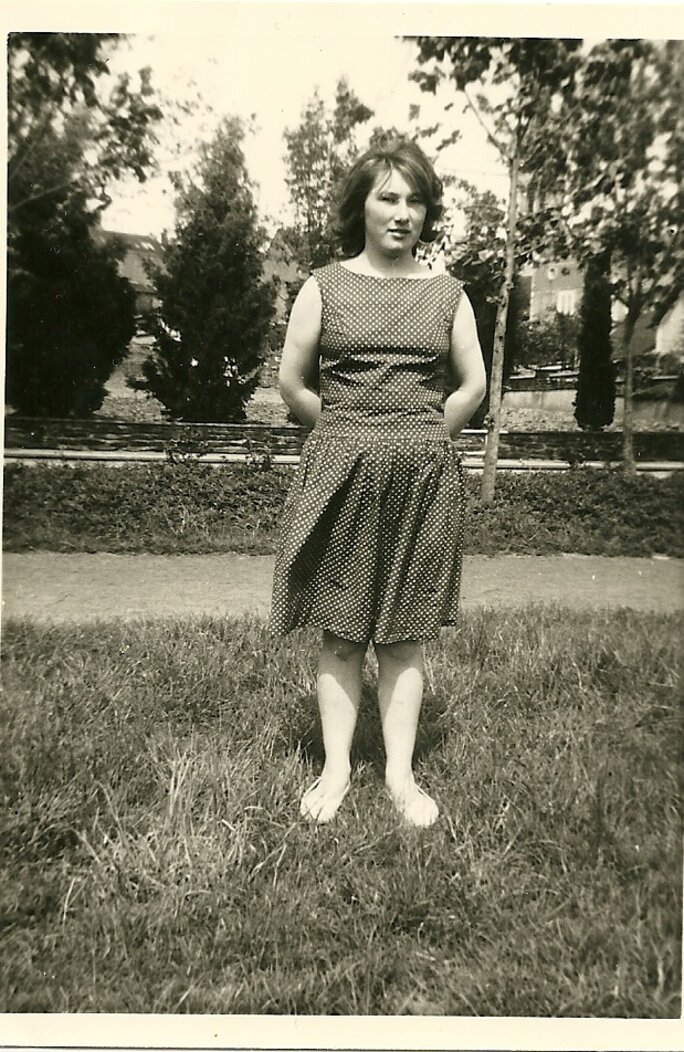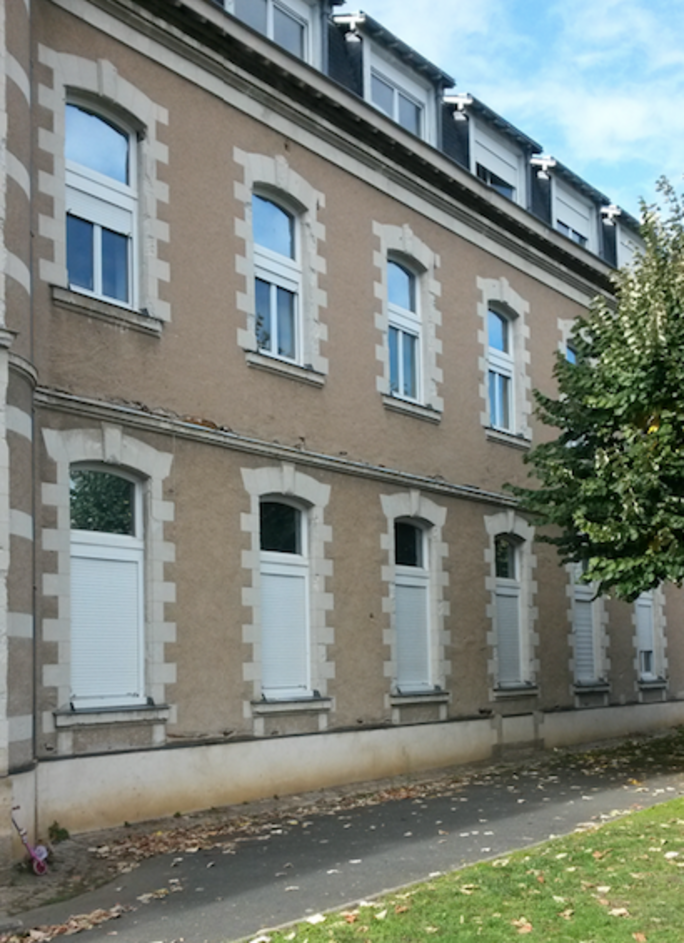They call themselves “Les Filles du Bon Pasteur”, but for the “Girls of the Good Shepherd”, not only did nobody lay down their lives to protect them, no-one did anything to save them from the violence they say they suffered at the hands of nuns among the Sisters of the Good Shepherd, a Catholic order whose self-proclaimed mission was to ensure their welfare.
Reno (not her real name, which she asked to be withheld) is now in her seventies. In 1960, when she was aged 13, she was removed from her family, on the decision of a magistrate, as a consequence of her father’s sexual abuse of her sister. She was placed in the care of one of the order’s establishments, in the town of Loos, in northern France, where she remained until 1964.
She still has a hollow in her left leg from an injury she sustained after a nun pushed her down a flight of brick stairs. Reno told Mediapart that she had just finished polishing a floor that she had cleaned, and when she refused a nun’s command to wash it again, she was then shoved down the stairwell. “I landed with my hands and knees bleeding and I was given no care,” she recalled. “I took care of myself with a rag. The next day I had blisters full of puss.”
Today, Reno, who suffers from chronic depression, remains traumatised by her experiences in the hostel.
Reno is one of 16 women members of the association Les Filles du Bon Pasteur, which they set up together last December. All of them were, when children, placed by a magistrate into the care of homes run by the Sisters of the Good Shepherd.
The aim of their association is to denounce the mistreatment they were subjected to all those decades ago. They are demanding that both the order, whose full title is the Congregation of Our Lady of Charity of the Good Shepherd, and the French government, present them with a public apology for the hardships they were subjected to, along with payment of compensation and free medical care for the physical and psychological consequences of what they suffered. They also want the unpaid labour they were ordered to carry out to be counted in their pension rights.

Enlargement : Illustration 1

An online chat forum was created among former children placed into the care of the order, and which has around 800 members, while a dedicated Facebook account brings together 177 of them. Many of the exchanges relate experiences of violence and other forms of mistreatment. However, some of the participants recount that the order saved them from the harmful environment of their families and that their placement with the nuns gave them an opportunity to receive education.
The Sisters of the Good Shepherd was founded in 1835, in the north-west French town of Angers, with the vocation of caring for women and girls in social difficulty, including those who had become prostitutes and others considered debauched. A century later, in 1940, when its activities were at their height, it had grown into an international network which, in rounded figures, operated 350 institutions in 40 countries, managed by a total of 10,000 nuns in whose care were 50,000 young women and girls.
In 1945, a decree gave the order an official status that recognised its establishments as places of protection for minors from dysfunctional families. During the 1950s and 1960s, thousands of adolescent girls from across France were placed in the order’s care.
Around three-quarters of these were aged between 12 and 16. “Many were victims of sexual assault, and considered to be at fault and responsible,” said historian David Niget, a lecturer with the University of Angers specialised in issues concerning children’s rights, and who has carried out extensive research into the conditions of the institutions run by the Sisters of the Good Shepherd.
Today, for many of those placed there, the stigma of being labelled as somehow shameful remains intense. “These women have absorbed the bad feeling with which society regarded them,” said Niget’s colleague Véronique Blanchard, a historian specialised in the justice system’s treatment of children, and notably girls, in difficulty. “Guilt sticks to them,” she added.
In most of the establishments run by the Sisters of the Good Shepherd, the girls were humiliated and made to feel shame. On their first arrival, each was examined to establish whether or not they were virgins. Marie-Christine Vennat, a member of the association Les Filles du Bon Pasteur, was placed in the order’s care between 1964 and 1967, at its hostel in Angers and then another in Orléans.
She told Mediapart how she had been examined by a male doctor who, “without a glove or speculum”, placed his finger in her vagina. “I screamed like a pig,” she recalled. “He said to me, ‘that’s fine’. Two years ago, I learned from my gynaecologist that it was rape.”

Enlargement : Illustration 2

As part of the Independent Commission on Sexual Abuse in the Church (CIASE), which was launched by the French Catholic Church following a slew of revelations of sexual assaults by clergy, women who were formerly placed in care with the Sisters of the Good Shepherd are among around 6,500 presumed victims of abuse who are being interviewed. The conclusions of the commission are due at the end of this year.
For the teenagers, their days at the institution were marked by prayers, silence and chores, such as scrubbing floors on their knees. Some of the stories about the conditions are grim; punishment included confiscation of their personal belongings or letters. Those who urinated in bed were made to wear their soiled sheet over their heads, those who were caught after running away had their hair shaved off, some were placed in solitary confinement. There are accounts of poor medical care, and a lack of sanitary towels. In the 1960s, such conditions were also reported in non-religious care institutions.
Marie-Christine Vennat spoke of one very violent scene involving “This sister [nun] who was shouting at us, who beat us”. She recalled: “One day she smashed the head of a girl against the sink. She was bleeding. I was petrified, I had never seen such violence in my life.”
She said when she went to consult her own case file, the nuns in Angers admitted to her in private that “to force me to eat the vomit that I had regurgitated in my plate was mistreatment”.
Some of the girls, like Éveline Le Bris, another member of the association Les Filles du Bon Pasteur, would spend up to eight hours per day on sewing or laundry work that was for outside companies or individuals, for which they earned a derisory amount. “After three and a half days I was paid the equivalent of four euros,” said Le Bris, who remembers using the money to go to the hairdressers and to buy a pullover.

Enlargement : Illustration 3

In order to succeed in their campaign for recognition and compensation for the mistreatment the say they endured, it is essential that the members of the association Les Filles du Bon Pasteur obtain their individual case files which are kept by the order. These include documents that reveal the justification given for their placement in care with the Sisters of the Good Shepherd, confidential details about their families, and notes which reveal how they were regarded by the nuns. But the order exercises a tight control over the information contained in the files – and which, importantly, may prove harmful to its image.
In 2002, a law was introduced in France which allows people who were placed in care to gain access to their case files. While these are categorised as public archives, they can be kept by private institutions on condition that they allow the same access as, for example, the public social services. On September 4th last year, Éveline Le Bris travelled to the offices of the Sisters of the Good Shepherd in Angers, where she was placed in care in 1963, to consult her file – and she received a shock. The notes it contained included a particularly unpleasant written portrait of her. “Head bowed, sulky appearance, dishevelled red hair falling on the eyes, Éveline has a very flawed appearance,” it read. “This is a girl of a vulgar and coarse kind.”
Her case file was read to her, over two hours, by one of the order’s nuns. “Once again, it was she who was telling me what I’d done,” said Éveline. “It was like [Émile Zola’s 1885 novel] Germinal. She even said to me, ‘If it's written, it must be true’. My morale took another beating.”
After that, Éveline consulted her case file with the public child social services department of the north-west town of Le Mans, situated about 80 kilometres from Angers. The notes in that file were similar, but the two social workers who sat with her proved to be more sensitive. “They were moved and outraged,” said Éveline. “Without me complaining, they were on my side. In Angers, at the Good Shepherd, that wasn’t the case. I was on their patch.”
'For the Good Shepherd sisters, there is a degree of denial'
Because the Sisters of the Good Shepherd keep their archives in-house (in strict conditions of security and preservation and managed by a fulltime archivist), the order obliges those who had been placed in care and who want to consult them to return to the scene of what for many remains a traumatic period.
It also maintains tight control over the files, copies of which are not automatically handed over. Up until at least 2018, and unlike the practices of the public social services sector, those consulting their case files were asked to sign an attestation that they would not communicate the contents. “Another example of the violence that is perpetuated,” commented David Niget. By law, someone who was placed in care is allowed to make public the contents of their case file, except for information that does not respect the right to privacy of third parties, that the identities of professionals is withheld, and that there is no threat to public order.

The children and grandchildren of a deceased person who was placed in care are also allowed by law to consult their files, while a former resident of a care home can appoint someone of their choice to access the file on their behalf. That is the case of Daniel (last name withheld), 62, whose mother does not want to personally visit the offices of the Sisters of the Good Shepherd. “I have asked the Good Shepherd for her file five or six times, by email and telephone,” he said. On each occasion, he was erroniously told that by law only his mother can consult her file.
Academic researchers studying the conditions and circumstances of children placed in care also come up against the refusal of the order to grant access to its archives, even though they are generally allowed, by special authorisation, to access personal case files. For researchers, the well-preserved archives of the order represent a treasure trove of information. Historian Véronique Blanchard, who has written several books on the history of children in care, was also turned away by the Sisters of the Good Shepherd. “It would appear that the Congregation considers my work is one-sided,” she said.
However, an exception was made in 2014, when a group of five historians, including David Niget, were allowed to investigate the files, in a project led by the Angers Congregation’s head, Magdalena Franciscus. The project was half-funded by the order, to the level of 15,000 euros, while the local public authorities provided the remainder. The project is to lead to the publication of a book, which is expected for the end of this year, and meanwhile the archives remain closed to all other researchers.
The order of the Sisters of the Good Shepherd is perfectly within its rights to keep the archives inside the establishment. But the controversy lies in the recurrent refusal, without a valid reason, to allow access to them. If they were based in a public institution, the law would require those responsible for the archives to justify a refusal of access. “Straightaway, the Good Shepherd does not consider a request, it is an immediate refusal, without leaving a trace,” said David Niget.
There are also accusations that the case files, or at least some of them, have been tampered with. Sylvie (not her real name), was placed in care of the establishment in Angers in 1967, and has consulted her case file. “I remember evaluation tests, when I wrote at each line ‘I want my freedom’. They have disappeared,” she told Mediapart.
“The files have been sifted through and cleansed,” insisted Niget, one of the rare historians to have gained access to them, in the project launched in 2014. “If one compares [them] with other institutions, those of the Good Shepherd are twice as less voluminous. Personal things about the girls have been destroyed. A lack of space and a lack of knowledge [of archive preservation] is a naïve explanation. It happens too in public sector, but there is also a probable decision to delete everything that might be troublesome.”
It appears impossible to establish when and to what extent information from the archives could have been destroyed. By law, since 2008, the destruction of archives considered to be public, as is the case here, is only allowed if authorised by the regional archive authorities.
The cases of the children placed into the care of the Sisters of the Good Shepherd is currently also the subject of a documentary still in preparation and whose director asked permission from the order to follow, in camera, the visit of Éveline Le Bris to consult her case file. The request was made with the full cooperation of Le Bris. “Our protocol for consultation does not allow for the discussions to be filmed or recorded,” she was told by the order. The social services in Le Mans, meanwhile, were happy for the cameras to be allowed to film her visit.
The order’s only public reaction towards the allegations of mistreatment of the girls placed in their care was in November 2019 when, in an interview published by Angers-based regional daily Le Courrier de l’Ouest, the “provincial” director of the Congregation, nun Patricia Diet, responsible for its activities in France, Belgium, Hungary and the Netherlands, said: “Where the aim was to recover the joy of life and personal dignity, we recognise that unsuitable behaviour sometimes tarnished laudable intentions. I profoundly regret this, and ask for forgiveness for these attitudes which prompted incomprehension and suffering.” But none of those placed in the care of the institution were addressed personally.
Contacted last December by Mediapart, sister Marie-Luc Bailly, who replaced Diet during the latter’s sick leave, admitted that the order had practiced “educative methods which today would cause a shuddering”, but she underlined the number of young girls who were, she believed, saved from their dire circumstances, and spoke only of two victims: “These two women are very bruised, they have the feeling that their requests have not been taken seriously. Every three or four years, their demands return. Yet they have been met on many occasions.”
The international organisation of the Congregation of Our Lady of Charity of the Good Shepherd, now based in the Italian capital Rome, was contacted on several occasions by Mediapart but it advised that questions should be submitted to the order’s representatives in France. Meanwhile, Cardinal João Braz de Aviz, the Vatican’s “prefect of the Congregation for Institutes of Consecrated Life and Societies of Apostolic Life”, declined Mediapart’s requests for an interview.
In the French Catholic Church, some are willing to talk openly about the issue. Véronique Margron is the president of the Catholic “Conference” of persons belonging to the French Church’s religious orders, the CORREF. “For the sisters of the Good Shepherd, there is a kind of frontal shock and a degree of denial,” she told Mediapart. “However, to make the distinction between what functioned well, and what did not, one must go to the full length of the truth, there where people were subjected to a violence that they should never have been subjected to. One must be capable of expressing one’s shame and, more than excuses, there must be acts.”
Vincent Neymon, deputy general secretary of the Catholic Bishop’s Conference of France, the CEF, told Mediapart: “No institution should escape revelations of events [of wrongdoing] that can have been committed within it. These institutions must not only seek out the truth of those events, but also of the silence or lies that sought to cover those people who were guilty.”
As for the French justice ministry, its spokeswoman Emmanuelle Masson said that the accusations of the former children placed in the care of the Sisters of the Good Shepherd “merits a full piece of research”, while she also confirmed that no official action had yet been decided. “The transfer of the archives towards the public [services] is also an idea for consideration.”
In Australia, a blog published on the order’s website by one of its senior officials, which celebrated its 150-year history in the country, she recognised that “for numbers of women, memories of their time with Good Shepherd are painful. We are deeply sorry for acts of verbal or physical cruelty that occurred: such things should never have taken place in a Good Shepherd facility. The understanding that we have been the cause of suffering is our deep regret as we look back over our history.”
In the Netherlands last year, a group of women launched a lawsuit against the Catholic Church for havinf been subjected, as underage girls, to forced labour in the institutions run by the Sisters of the Good Shepherd. At the end of the year, 140 former residents of the institution received official apologies from the Dutch justice ministry and 5,000 euros each in compensation. In a letter sent to the victims, written in Dutch, Patricia Diet recognised that “the practices” at the time they were in care were improper.
In Ireland, meanwhile, the revelations of the hard labour conditions of laundries run by the Magdalene Sisters, but also the Sisters of the Good Shepherd and other Catholic orders, caused widespread uproar .
“Within the Congregation, the fear of a contagion of the Irish [events] is predominant,” said David Niget. “There’s the belief that a lid can still be placed over the pan. But I have good hope that one day there’ll be a recognition. Thanks to #MeToo, the [recognition] of the status of victim is today possible. Even if the moment of recognition will be painful and conflictual.”
-------------------------
If you have information of public interest you would like to pass on to Mediapart for investigation you can contact us at this email address: enquete@mediapart.fr. If you wish to send us documents for our scrutiny via our highly secure platform please go to https://www.frenchleaks.fr/ which is presented in both English and French.
-------------------------
- The original French version of this report can be found here.


